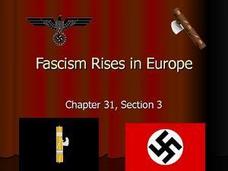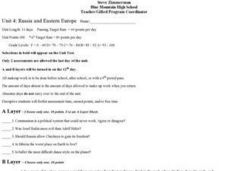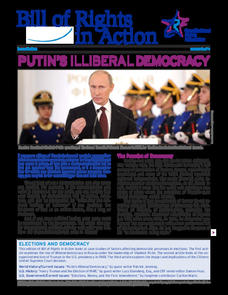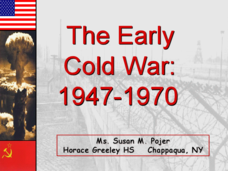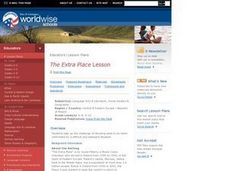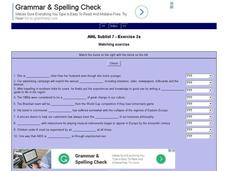Curated OER
Emerging Democracies in Eastern Europe and Russia: How Are They Doing?
Students consider the success of democracies in Eastern Europe. In this government systems lesson plan, students research the implementation of democratic practices and rule in the countries of Eastern Europe following the Cold War....
Curated OER
Fascism Rises in Europe: Ch 31
Help your class understand how Hitler achieved power prior to World War II. A strong presentation outlines the post-World War I social and economic context that primed Eastern Europe for a totalitarian dictator. It presents the...
Curated OER
Russia and Eastern Europe
Students study Russia and Eastern Europe. They select from a menu of option activities to demonstrate their knowledge of both countries including preparing meals, reading Russian works of literature, analyzing political cartoons and...
Curated OER
Rusyns Survive Time in Central & Eastern Europe
Tenth graders study the different ethnicities in Europe. In this Eastern Europe ESL lesson, 10th graders read an article and complete guided questions. Students participate in a debate.
Curated OER
People Power
Students view a television program that explores many Eastern European residents' discontentment with communism. They work in groups to research living conditions in an Eastern European country before communism, under communism and...
Curated OER
The Marshall Plan for Rebuilding Western Europe
Pupils examine the aftermath of World War II. For this Marshall Plan lesson, students listen to their instructor present a lecture regarding the plan to rebuild Western Europe and its outcome. Pupils respond to discussion questions...
Curated OER
Capturing the Reader With Vivid Images
Students examine how the author tries to capture the reader's imagination immediately, through imagery--and hold on to it. They locate Ukraine on a world map and understand Lenin's role in the establishment of Russian communism and the...
Curated OER
Understanding Communism Past and Present
Students can learn about communism by exploring the countries where this political system was established.
Constitutional Rights Foundation
Putin's Illiberal Democracy
Is Russia really a democracy? High school scholars explore Russian democracy under the leadership of President Putin. The resource provides opportunity for group discussion, writing, and research to understand Russia's political history,...
Curated OER
The Role Of NATO
Students examine the role of the North Atlantic Treaty Organization (NATO). In this NATO lesson, students research the Truman Doctrine, the Marshall Plan, Winston Churchill's "Iron Curtain" speech, and the Berlin airlift and how they...
Curated OER
The Origins of the Cold War, 1945-1949
Students investigate the early years of the Cold War and the origins of containment. Both supporters as well as critics are probed to examine the differences that emerged in the months following the end of the war in Europe. This unit...
Delegation of the European Union to the United States
The Founding and Development of the European Union
How did Europe transition from a period of conflict to a period of sustained peace? As class members continue their study of the history and development of the European Union, groups examine the events in six time periods, from the...
Curated OER
Looking Back
Pupils examine the difference between a communist and a free-market economy. They discuss challenges occurring in Macedonia and explain the mood of its people.
Smithsonian Institution
Cold War
The Cold War was not necessarily always cold in temperature, but the relationship between the United States and the Soviet Union sure was frigid! Scholars read various passages, view exhibition graphics, and observe an artifact from the...
Curated OER
The Extra Place Lesson
Pupils explore communication skills. In this Peace Corps lesson, students read "The Extra Place," by Susan Peters and discover Polish cultural traditions. Pupils consider how they would respond in a scenario that challenges their...
Curated OER
The Early Cold War: 1947-1970
With a combination of images, maps, and valuable information, this presentation is a strong resource for a history class that is coming out of a WWII unit and into a Cold War unit. Some points are outlined for students, while others are...
Curated OER
The Extra Place
Students read and discuss the story of a Peace Corps volunteer's experiences in Poland. They read and write a response to the story, and participate in a class analysis about their own personal decision regarding the story.
Student Handouts
End to the Cold War
Introduce your class to topics relating to the Cold War through a brief reading selection. Class members read the passage and answer four questions, which are provided on the bottom of the page.
Curated OER
English Vocabulary Skills: AWL Sublist 7 - Exercise 2a
In this online interactive English vocabulary skills activity, students answer 10 matching questions which require them to fill in the blanks in 10 sentences. Students may submit their answers to be scored.
Curated OER
Multiple Perspectives on the Korean War
Young scholars interpret historical evidence presented in primary and secondary resources. In this Korean War lesson, students examine and analyze primary sources regarding U.S. involvement in the Korean War.
Curated OER
Cold War II
In this Cold War worksheet, students examine political cartoons from the era and then respond to 10 short answer questions. The cartoons are not included.
Curated OER
English Lesson Plan on World Freedom Day
In this ESL grammar and comprehension worksheet set, learners read a selection about World Freedom Day. They complete matching, fill in the blank, short answer, and word choice activities based on the reading.
Curated OER
World Religions
Ninth graders investigate the symbols and historical figures of the five main religions of the world. They participate in a class discussion, listen to a lecture and take notes, and write five Haikus, one about each major religion of...
Curated OER
The Importance of Speaking Another Language
Students evaluate how important it can be to speak a language other than their own.
They analyze the role language plays in bridging cultural differences and compare their reasons and see if the class can reach a consensus on the...



